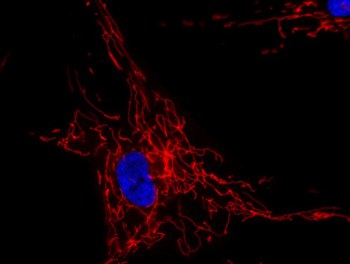
Fig. 1: Visualisation of the mitochondrial network and nucleus in human cells using fluorescence probes.
Research themes
1) To define the role of mitochondrial metabolism in modulating tumorigenesis in order to identify new metabolic targets as adjuvant anticancer therapy, with particular interest in ovarian cancer. The main objective of this research is to demonstrate that respiratory chain complex I is a lethality target by identifying the biochemical and molecular mechanisms that are activated by the lack of this enzyme in different tumour models and how these mechanisms modulate the various stages of tumour progression in vitro and in vivo. In addition, the adaptive mechanisms that tumour cells develop following the inhibition of complex I or its genetic ablation are currently being studied.
2) To define the ways in which respiratory complexes organise themselves into dynamic supramolecular structures to adapt to metabolic changes and to cope with severe energy dysfunctions caused by mitochondrial mutations. Interest is particularly focused on the structural and functional relationships between complex I and III under physiological and pathological conditions, the role of oxidative stress and the identification of new therapeutic strategies for the treatment of mitochondrial diseases.
3) Identification of new assembly factors of complex I of the mitochondrial respiratory chain and new interactors of this enzyme, in order to clarify its assembly mechanism.
For more information see the MitoB&B website (https://site.unibo.it/mitobb/en)